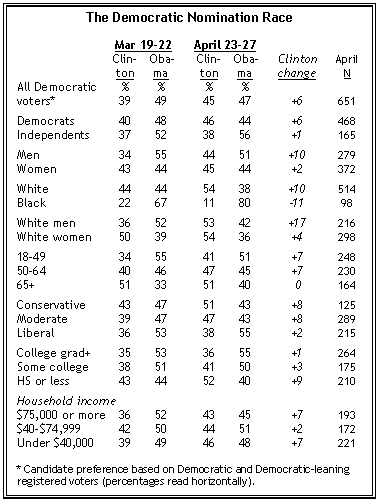
Clinton has whittled away Obama’s advantage in the race for the Democratic nomination in part because of her growing strength among white voters, especially white men. Clinton now leads Obama among white male Democratic voters by 11 points (53% to 42%). In March, she trailed Obama among white Democratic men, 36% to 52%.
Clinton also has recaptured her advantage among less educated Democratic voters. She now leads among Democratic voters with no more than a high school education by 12 points (52% to 40%); in March and late February, these voters divided fairly evenly between Clinton and Obama. Earlier in the campaign, Clinton led by a wider margin among non-college voters (by 60%-24% in early February).
Obama continues to maintain substantial advantages among both college graduates and liberal Democratic voters. He leads among college grads by 55% to 36%; his lead among college graduates has held steady at about 20 points since early February. Obama also has led among liberal Democratic voters by solid margin since late February, and leads 55% to 38% currently. By comparison, moderate Democrats have divided their support fairly evenly between Obama and Clinton since early February.
Long Campaign Taking a Toll
The undecided primary contest has taken a toll on how the supporters of Clinton and Obama view the other candidate. More than four-in-ten Obama supporters (46%) now express an unfavorable opinion of Clinton; approximately the same proportion of Obama backers (44%) expresses an unfavorable view of Clinton.
Negative opinions of each candidate among the other’s supporters have risen gradually since early February. At that time, only about three-in-ten Clinton and Obama supporters had an unfavorable view of their candidate’s rival.
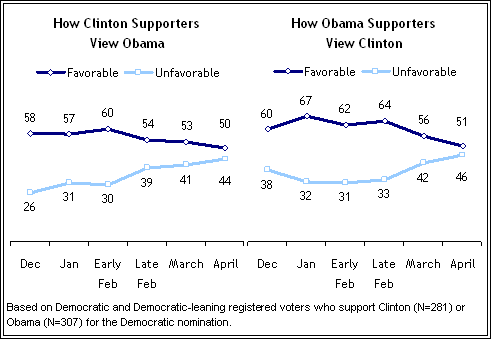
Obama’s Electability Edge Narrows
Neither Obama nor Clinton has a clear electability advantage over McCain in the eyes of voters. In an Obama-McCain matchup, 47% think Obama would win, and 42% pick McCain. If Clinton is the nominee, the margin is only slightly different (45% think she would win, 46% McCain.)
By contrast, Obama held a clear edge in perceived electability a month ago. In late March, voters picked Obama to win over McCain by a 50% to 38% margin. That was substantially different from how people predicted a Clinton-McCain outcome (42% Clinton, 46% McCain). Overall, the shrinking of the electibility gap reflects a slight increase in the number of people who think Clinton can win, and a slight decrease in the number who think Obama can win.
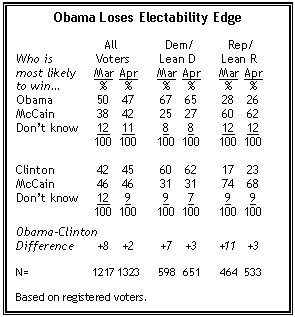
Among Democratic and Democratic-leaning voters, about the same number say either Obama (65%) or Clinton (62%) can beat McCain this fall; in March, 67% said Obama was likely to beat McCain and 60% said the same about Clinton. In addition, Republican voters saw Obama as more of a threat than Clinton a month ago (28% said he could beat McCain, 17% said the same about Clinton). Currently, 26% of Republicans say Obama is more likely to beat McCain, while 23% expect Clinton to win.
Among Democratic voters, supporters of Obama and Clinton overwhelmingly believe that their candidate will prevail in a general election matchup against McCain. Fully 79% of Obama supporters and 77% of Clinton supporters believe their candidate will beat McCain. There is less consensus, however, that the other Democratic candidate can win. Only half of Clinton supporters (49%) say Obama will win and 49% of Obama supporters say Clinton will win.
When the two races are analyzed together, 44% of Democratic voters believe that either Democratic candidate is likely to beat McCain in the fall. A third of Democratic voters believe that one of the two Democratic candidates would lose to McCain, and 11% believe that McCain will win regardless of whether Obama or Clinton is the nominee.
When pressed to predict which of the two Democratic candidates has the better chance against McCain in November, Democratic voters give Obama an advantage (47% to Clinton’s 37%); Republican voters see little difference (38% say Obama compared with 34% who say Clinton).
More Dems Want Contest Settled
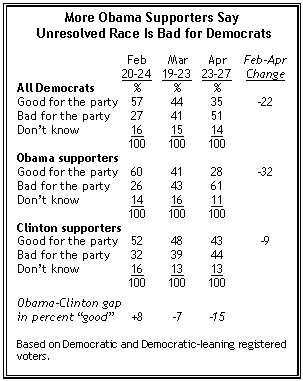
In late February, more than twice as many Democratic and Democratic-leaning voters said that the fact that the nomination was not yet decided was good, rather than bad, for the party (57% vs. 27%). But the balance of opinion on this question has changed dramatically; a majority (51%) now says the undecided nomination contest is bad for the party while slightly more than a third (35%) sees it as a good thing.
Obama supporters, in particular, have reversed their opinion of the unresolved nomination fight; in late February, 60% said it was good for the party, but currently about the same percentage (61%) sees it as a bad thing for the party. Views among Clinton’s supporters have shifted less dramatically. In the current survey, 43% of Clinton supporters say the unresolved contest is good for the party, down nine points since late February.
If the Democratic race continues and super delegates decide the nomination, 53% of Democratic voters say that the super delegates should vote for the candidate who has won the most support in the primaries and caucuses, while 40% believe they should vote for the candidate who they think has the best chance of defeating John McCain in November.
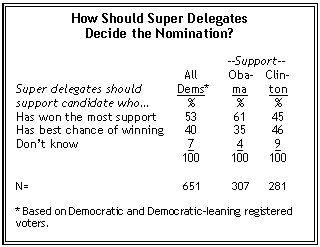
Fully 61% of Obama supporters believe that the super delegates should back the candidate who has amassed the most support, while just 35% say they should back the most electable candidate in the fall. Clinton supporters are evenly divided; 45% say the candidate who has won the most support, while 46% say the candidate who has the best chance of defeating McCain.


